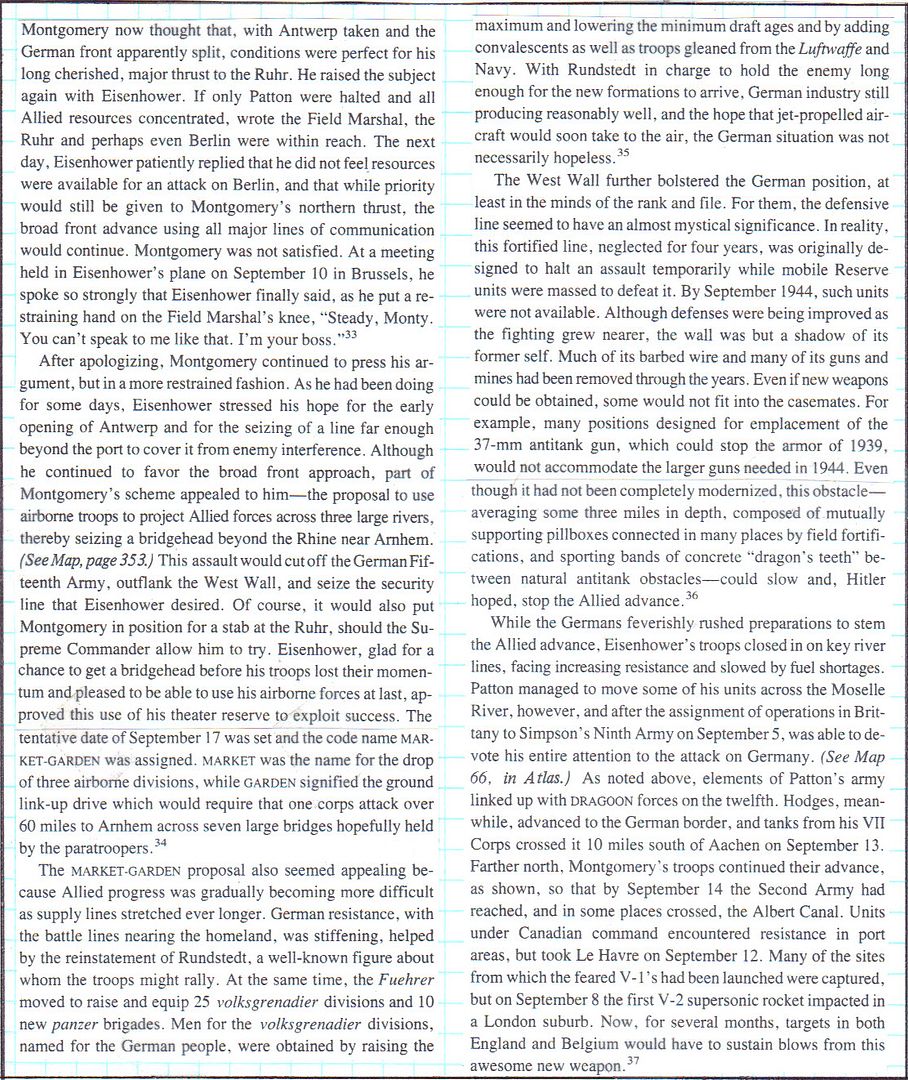
The West Point Military History Series, Thomas E. Griess, Editor, The Second World War: Europe and the Mediterranean

The West Point Military History Series, Thomas E. Griess, Editor, The Second World War: Europe and the Mediterranean
http://home.online.nl/cclinks/abtf/septem~2.html
September 10, 1944
Belgium
Eisenhower flies to Montgomery’s headquarters near Brussels. Again, as on August 23, Montgomery denounces Eisenhower’s broad-front strategy and pushes for his own single-thrust strategy. At one point, Eisenhower reminds Montgomery who the commander is; Monty, momentarily subdued, apologizes but then unveils a new twist on his single-thrust strategy.
The field marshal proposes Operation Market-Garden. Montgomery wants to use the First Allied Airborne Army to seize a series of bridges along a roughly 60-mile corridor from Eindhoven to Arnhem in Holland (Operation Market). The bridge at Arnhem, over the Lower Rhine, is the real prize. Once the airborne units begin landing, XXX Corps will drive through the corridor and across the captured bridges (Operation Garden). Possession of the Arnhem bridge will give Montgomery - and the Allies - the crossing needed to flank the West Wall and roll up the German flank all the way to Berlin.
Eisenhower is immediately impressed by the bold and imaginative plan but sees a dilemma. If he agrees to the plan, he must deny further supplies to Patton (and his drive on the Saar River in the south). More importantly, it will shift the focus of operations from making Antwerp the working port the Allies desperately need, regardless of their grand strategy.
But if he disagrees with Montgomery’s plan, Eisenhower is ignoring strong suggestions from Washington to utilize the First Allied Airborne Army; he’s also saying “no” to a chance to end the war by the end of 1944.
Eisenhower decides to take a risk but limit his exposure. He agrees to let Montgomery launch his airborne operation but does not agree to a subsequent drive into the Ruhr River valley. Eisenhower wants the operation to be part of the larger effort, an extension of the broad front. The supreme commander also wants Montgomery’s assurance that the shift of focus away from Antwerp is temporary. Montgomery goes a step better - he assures Eisenhower that the 21st Army Group can carry out both operations - clearing the Scheldt Estuary and flanking the West Wall - simultaneously. Eisenhower accepts Montgomery’s word.
Eisenhower has a final stipulation: The operation must be carried out as soon as possible. When the meeting is over, Montgomery is elated. But even with Eisenhower’s approval, Montgomery is still not satisfied. Now that his operation has been approved, Monty reverts to character; the meticulous planner who doesn’t move until every detail has been attended to. He needs not the majority of the supplies, but all the supplies, to make his pet operation work. Eisenhower reluctantly agrees to temporarily divert the supplies to Operation Market-Garden.
http://www.armchairgeneral.com/a-lingering-controversy-eisenhowers-broad-front-strategy.htm
The storm brewing between Eisenhower and Montgomery came to a head on September 10 during a tense face-off between the two men. Montgomery had insisted on a meeting and in keeping with his custom that the senior officer should visit his subordinates, Eisenhower readily agreed. The two met aboard Eisenhower’s aircraft parked on the tarmac at Brussels airport. The meeting began innocently enough until Montgomery pulled from his pocket the signals exchanged between them for the past week. The new field marshal wasted no time launching into perhaps the most intemperate and foolish outburst of his career. In language fit for a drill instructor addressing recruits, Montgomery testily condemned everything about Eisenhower’s plan, and why it would not work. Pulling Eisenhower’s recent signals from his pocket, he exclaimed, “They’re balls, sheer balls, rubbish!” Perhaps only Eisenhower would have the forbearance to sit in stony silence while a subordinate verbally assaulted him. When Montgomery at last paused for breath, Eisenhower put his hand on Montgomery’s knee and gently said, “Steady, Monty! You can’t speak to me like that. I’m your boss.” For one of the few times in his career, Montgomery muttered, “I’m sorry, Ike,” and the meeting concluded in less acrimonious fashion, but with neither general giving in to the other. The broad front advance to the Rhine would continue, declared Eisenhower.
Eisenhower’s refusal to back Montgomery’s single-thrust plan was not only based on philosophical differences, but on intelligence estimates that the Germans were simply too weak to hold the Siegfried Line or to stop an Allied advance on both the Ruhr and the Saar. Privately, Ike was deeply troubled by the rancorous September 10 meeting. Montgomery’s repeated challenges left him openly questioning his loyalty, and he derided Monty’s plan as a “mere pencil-like thrust” inconsistent with his concept that the war would be fought and won by Allies advancing on a “broad front.”
Montgomery’s lack of tact, his frequent letters exhorting Eisenhower to change his mind, and now their face-off in Brussels drove an even deeper wedge in their relations. Montgomery had failed to discern that to attempt to run roughshod over Eisenhower was a waste of time that did more harm than good. Or that behind the calm exterior that permitted free rein to the British field marshal was the unforgiving side of Eisenhower who never forgot the slights and the criticism of his decisions. Montgomery’s pride and his belief in the correctness of his plan left him equally unapologetic. “I’m trying to fight a war, and I can’t help it,” he told his aide.
Two proud men that believed in the validity of their cause was a prescription for an impasse. Eisenhower’s great instinct for compromise influenced his decisions during the most critical weeks of the war. Had the logistical support existed without utterly crippling everyone else, there was a strong case to be made for Montgomery’s bold, single-thrust, the ultimate prize being an end to the war in 1944.
It looked so good on paper.